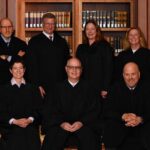Supreme Court finds error in Eagle County’s valuation of luxury Vail resort

Eagle County improperly included income from separately-owned condominium units when it estimated the property value of a luxury Vail resort, the Supreme Court decided on Tuesday.
The county had valued The Lodge at Vail at roughly double what its owner, Vail Resorts subsidiary Lodge Properties, Inc., believed it was worth. The discrepancy stemmed from how the Eagle County assessor and the county’s Board of Equalization treated the unique physical layout of the property.
The Lodge has approximately 160 rooms, but only 80 are part of the hotel. The rest are privately-owned condominiums. Other Vail Resorts subsidiaries, RockResorts International and Vail/Beaver Creek Resort Properties, provide rental management services for the majority of the condo units, renting to guests who are unaware whether they are staying in a Lodge-owned room or a condo.
The contracts between the condo owners and Vail’s entities also provide guests and owners access to the hotel’s amenities. In exchange, Vail/Beaver Creek collects 40% of the rental proceeds.
The Eagle County assessor valued The Lodge’s taxable real property at $41.1 million in 2017 by including the Vail/Beaver Creek income stream. The county’s appraiser defended the move by saying the income derived from The Lodge property itself.
But the Supreme Court concluded that the income was neither “generated by” nor “somehow attributable to” Lodge Properties’ ownership of the hotel.
“It is undisputed that the Lodge and the condominiums are legally separate and distinct parcels of real property, and therefore, these properties must be separately appraised and valued,” wrote Justice Richard L. Gabriel in the Feb. 22 opinion. “Accordingly, rental income generated by the condominiums cannot be assigned to the Lodge, which is a separate parcel of real property owned by a different taxpayer.”
The decision reversed the Court of Appeals, which had previously endorsed the county’s approach to valuing The Lodge. The appellate court reasoned that if Lodge Properties were to sell The Lodge at Vail, the income from the condo rentals would transfer to the new owner.
“(W)e are hard-pressed to believe that a purchaser of LAV would agree to the sale without also securing the rental contracts that would allow it to collect over $3.6 million in rental revenue,” wrote Judge Neeti Vasant Pawar for the Court of Appeals.
The Supreme Court acknowledged that the condo income might affect the hotel’s market value, but that was a “different question” from whether The Lodge itself generated the income. Gabriel pointed to previous testimony that the rental income would “not necessarily” transfer upon the sale of The Lodge. The justices instead believed the income was what The Lodge’s agreements said it was: compensation for managing the condo rentals.
Vail’s subsidiaries would rent the condos, make repairs, collect rental payments, provide housekeeping services and perform marketing.
“Simply stated,” Gabriel wrote, the “rental management agreements are contracts for … management services, paid for out of net rental income generated by the condominiums; the agreements are not contracts for an interest in (or the use of) the Lodge’s real property.”
Attorneys for Lodge Properties argued to the Supreme Court last year that a property’s valuation could not include income from a “separate, off-site property.” Eagle County responded that the income stemmed in substantial part from The Lodge’s physical integration with the condos. At one point, the county accused Vail Resorts of engaging in a “corporate scheme to avoid taxation.”
Lodge Properties claimed that it was actually the county’s position that would lead to tax evasion.
“A taxpayer need only argue,” the company wrote to the court, that it “‘defies logic’ to presume that her property generates all its rental income on its own – surely nearby Coors Field or redeveloped Union Station should really get the credit – so her tax liability should be reallocated to other parcels.”
The Supreme Court appeared to foreclose on that possibility by pointing out that even if two properties are physically integrated, “legally distinct parcels” need to be valued and appraised separately.
Gabriel added that the court saw no evidence that anyone involved in the litigation has avoided paying taxes.
The case is Lodge Properties et al. v. Eagle County Board of Equalization.














